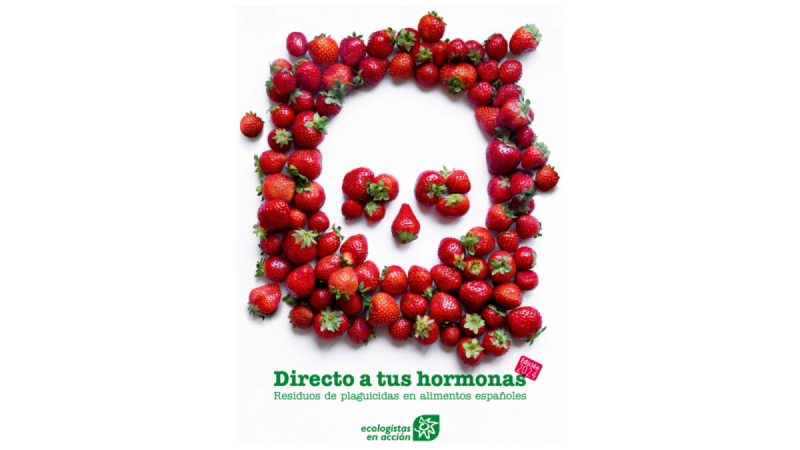According to the study “Straight to Your Hormones” by our member, Ecologistas en Acción, food sold in Spain in 2022, both imported and state-produced, had residues of 106 pesticides. The study analyses the latest official data from the Spanish Agency for Food Safety and Nutrition (AESAN).
Spain has been the leader in pesticide sales in the European Union for years. In 2022, the country dropped to second place. There was a 26% reduction in sales that was not due to a reduction policy but to the severe drought and the EU ban on certain pesticides.
The study “Straight to Your Hormones” covers the results of the analyses carried out by the Spanish Agency for Food Safety and Nutrition (AESAN). 1,743 samples of food for sale in Spain in 2022 were analysed to identify the presence of pesticides. There was a focus on the detection of three particularly toxic groups: unauthorised substances; substances that are candidates for replacement due to their high toxicity; and those that have the capacity to alter the hormonal system or are endocrine disruptors.
The first result of the study is that the initial analysis data are becoming less representative each year. AESAN continues its downward trend in the number of samples taken, which places Spain at the bottom of the EU with 3.61 samples per 100,000 inhabitants.
Food sold in 2022, both imported and state-produced, had residues of 106 pesticides, meaning that 36% of samples had residues of one or more pesticides. This percentage increases to 43% for vegetables and fruits.
Specifically, the following were detected:
- 59 endocrine-disrupting pesticides, including DDT.
- 32 pesticides NOT authorised in the European Union.
- 17 pesticides that are Candidates for Substitution due to their carcinogenic, reproductive toxicity, endocrine disruption effects or those that meet 2 of the following 3 characteristics: persistence, bioaccumulation and toxicity.
The Spanish population is exposed to all these pesticides via food. Even if only in small quantities, since in 99% of cases they did not violate the legal limits. Ecologistas en Acción asked for laws to be revised because they do not take into account that hormone-disrupting pesticides act at very low doses. Nor do the legal limits take into account the combined effect of a multitude of substances. An effect that puts food safety at risk and cannot be analysed in any toxicity study, something that the scientific community warns about. The pesticide cocktail occurs, in 22% of cases, with multiple samples contaminated with several pesticides. The extreme case is that of a pear sample that contained residues of 9 different pesticides!
The health of people working in the fields is also put at risk, too often without the appropriate safety measures and, of course, the natural environment surrounding the fields where pesticides are applied is seriously affecting biodiversity.
There are more pesticides present than those analysed. AESAN does not look for the presence of substances actually used in agriculture in its analyses, such as glyphosate, the second most sold pesticide in Spain in 2022, but whose presence was not sought in any sample.
From all of the above, it can be deduced that Spain continues to rely on a food system that is highly dependent on pesticides. This puts the health of the population, workers and nature at risk.
Ecologistas en Acción asks the Spanish Food Safety Agency to improve food control by increasing the number of samples analysed and the number of pesticides analysed in each sample. This should include pesticides actually used in the fields, such as glyphosate. On the other hand, the Ministry of Agriculture should help food produced in Spain to differentiate itself as healthy, non-toxic products that allow its producers to live with dignity.
